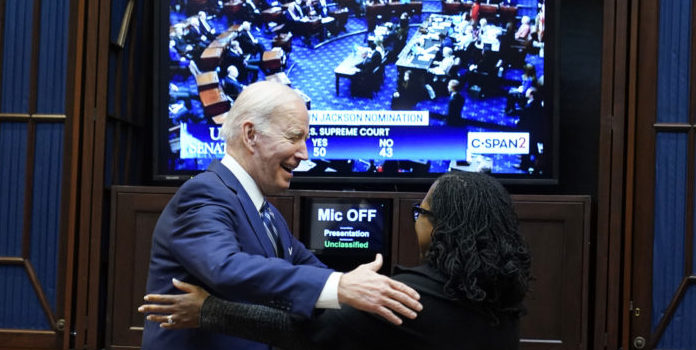(Headline USA) The Senate confirmed Ketanji Brown Jackson to the Supreme Court on Thursday, delivering a much-needed win for President Joe Biden with help from three RINO senators.
Jackson, who will take her seat when Justice Stephen Breyer retires this summer, joined Biden at the White House to watch the vote, the two embracing as it came in.
The new justice’s elevation is not likely to alter the court’s idealogical makeup significantly, with Jackson replacing the consistently left-voting Breyer in the court’s three-person liberal voting bloc.
But her extremist views in support of judicial activism and a record of going soft on criminals undoubtedly will shape the court over time—potentially for decades to come—as far-left groups like Justice Democrats, which has endorsed radical court-packing, find their first success in exerting activist pressure on the Democrat administration.
Once sworn in, Jackson, 51, will be the second youngest member of the court after Barrett, 50. She will join a court on which no one is yet 75, the first time that has happened in nearly 30 years.
However, focus from the extreme—and sometimes violent—Left may now shift to court elder-stateman Clarence Thomas, 73, largely considered its most conservative justice, who recently spent an extended stay in a hospital with an undisclosed illness.
Jackson, an appeals court judge with nine years experience on the federal bench, was confirmed 53-47, with the support of GOP Sens. Susan Collins of Maine, Mitt Romney of Utah and Lisa Murkowski of Alaska.
During the four days of Senate hearings last month, Jackson told senators she would apply the law “without fear or favor,” although Republican critics, emphasizing her record to the contrary, were largely skeptical.
Her relatively smooth confirmation marked a departure from the tactics of Democrats during the Trump administration, who fought three bruising and divisive battles to smear and undermine the esteemed jurists.
Senate Majority Leader Chuck Schumer, D-NY, said ahead of the vote that Jackson’s confirmation would be a “joyous day—joyous for the Senate, joyous for the Supreme Court, joyous for America.”
Statements from Collins, Romney, and Murkowski all said the same thing—they might not always agree with Jackson, but they found her to be enormously well qualified for the job.
Collins and Murkowski both decried increasingly partisan confirmation fights, which began when Biden was a leading voice on the Senate Judiciary Committee and only worsened during the battles over Trump’s three picks.
Collins said the process was “broken” and Murkowski called it “corrosive” and “more detached from reality by the year.”
Republicans spent the confirmation hearings strongly questioning her sentencing record, including the sentences she handed down in child pornography cases, which they argued were too light.
Democrats criticized the Republicans’ questioning, often using predictable race-baiting tactics to deflect from the issues.
In an impassioned moment during the hearings last month, Sen. Cory Booker, D-NJ, told Jackson that he felt emotional watching her testify. He said he saw “my ancestors and yours” in her image.
“But don’t worry, my sister,” Booker said. “Don’t worry. God has got you. And how do I know that? Because you’re here, and I know what it’s taken for you to sit in that seat.”
Jackson will be just the third black justice, after Thurgood Marshall and Thomas, and the sixth woman. She will join three other women, Sonia Sotomayor, Elena Kagan and Barrett—meaning that four of the nine justices will be women for the first time in history.
A benificiary of Biden’s affirmative-action-based campaign promise to nominate a black woman, she has pledged to sit out the court’s consideration of Harvard’s race-based admissions program since she is a member of its board of overseers.
But the court could split off a second case involving a challenge to the University of North Carolina’s admissions process, which might allow her to weigh in on the affirmative action issue.
Adapted from reporting by the Associated Press

